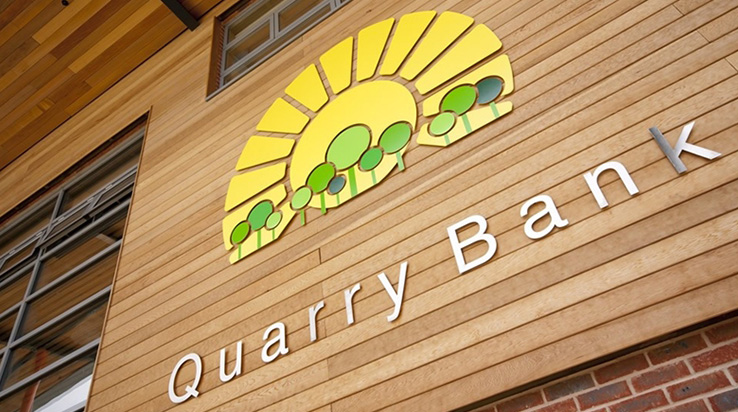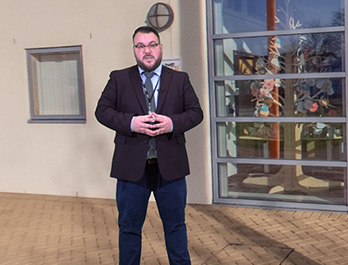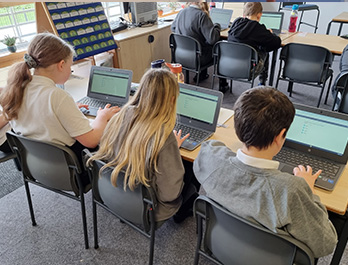
The Background
Quarry Bank Primary School is a 1.5 form Primary School, teaching around 380 children from Nursery to Year 6 on the Quarry Bank High Street in Dudley – in the heart of the West Midlands. The catchment is varied with roughly a third of pupils eligible for pupil premium, but whilst the area is historically quite industrial, it is located close to the Merry Hill Shopping Centre.
The school’s values dictate the way the school has always operated – in asking their children to work hard, be kind, and to better themselves. Perhaps with that in mind, they recognised at an early stage the importance of technology within an education environment, appointing RM over 11 years ago to provide regular technical support on-site and remotely. RM manage all of their computer devices and support the school’s technology infrastructure.
“The school relies on our Technology Account Manager at RM to support us in deciding our school’s technology strategy whilst ensuring we take advantage of all the services that we buy in to”.
Alex Rawlings, Headteacher
The Challenge
Despite this – but like many Primary Schools in this country prior to the Coronavirus pandemic turning everything upside down in March 2020 – Quarry Bank Primary did not have many computer devices, nor would they admit to being particularly technologically advanced. Whilst there were several members of staff that had some of this expertise, the pandemic forced everyone to gain this appreciation and to share knowledge.
“Whilst it seems odd to say it now, at the time there was certainly a resistance to move to new tech and engage with cloud-based provision and learner platforms. CC4 access was being used to enable staff to connect remotely, but our hardware was limited and our appreciation of what it could do, likewise”.
Alex Rawlings, Headteacher
Whilst the school had made earlier attempts to migrate to cloud-based infrastructure, they were never sustained, and there were always other priorities – such as responding to Ofsted inspections, and putting in place the type of improvements that that necessitated.
The Response
That said, when the Prime Minister made his announcement on 18th March 2020 that schools would close to all but the vulnerable and children of key workers, the school quickly realised that they were better prepared than they might have thought, with many of the basics already in place.
“We followed very clear teaching principles and we were confident in our ability to create resources to share with the children whilst they were at home, however we lacked the means to share and communicate that with parents”.
Alex Rawlings, Headteacher
As such, the first Lockdown became a turning point for the school, as they had to engage with learning platforms and portals to share work.
Initially, the school widened its existing use of Class Dojo as a school platform. Each teacher was able to share their learning activities with their pupils and they had a fantastic means of keeping in touch with the whole-school community. This platform enabled the school to be available to parents during a very stressful and anxious time – supporting families academically and pastorally.
“In the first Lockdown we were galvanised as a community and parents loved seeing photos and videos of work being completed at home”.
Alex Rawlings, Headteacher

Lockdown 2 – however – took them to a new level. They retained all of the positives from Class Dojo but expanded them with the Microsoft teaching tools to make a much stronger academic offer.
Being better prepared, the school were able to provide all of their learners with their own Office 365 login details (alongside other platforms such as TT Rockstars, Spelling Shed and Read Theory). They were also better prepared with hardware – purchasing additional Chromebooks through RM, meaning that the laptops they used for the delivery of the Computing curriculum could now be provided to teachers so they could use a school laptop to deliver home-learning. Visualisers were also bought for all staff so that they could record elements of teaching to share with the children.
“We decided to offer both asynchronous and synchronous teaching to our students. Being able to share a mixture of live lessons and pre-recorded meant that the majority of our children could access most of the learning”.
Alex Rawlings, Headteacher
Lessons were often recorded through MS Stream or straight through the Class Dojo platform. MS Teams was used a great deal for children to access lessons but more importantly, they made live sessions available for children to just catch-up on the day and check in with them on a pastoral basis. Some teachers used the technology to regularly hold parent mornings where they would have a coffee with parents in an attempt to stay connected but to also acknowledge parent’s wishes and feelings.
Towards the end of the second Lockdown, MS Forms was introduced so that children could receive instant feedback on their learning in a way that teachers could help reduce their workload (in terms of marking).
At the same time, Google Forms was being used to ascertain parents’ views of home-learning – which whilst hugely positive, identified a concern amongst many parents about their children’s mental health needs. It was at that point that the school adjusted their remote learning offer so that as well as an emphasis on the c ore subjects, they also introduced a focus on mindfulness and wellbeing.
“The use of MS Teams and Class Dojo helped us to stay in touch with the children and helped them to feel connected”.
Alex Rawlings, Headteacher

The school were now flying, adding third-party tools such as scavenger hunts embedded into their interactive virtual school tour (produced by a local school photography company) to invite the children back into school and providing conversation points to talk with their parents about their place in the class and where they go out to play.
Whilst most teachers think most about their delivery, in a Remote Learning environment one of the bigger challenges lies in adjusting to the environment where the learner is being taught. The difference is subtle, but important.
“We knew that rather than having a stable environment such as a classroom, teachers now had 30 very individual environments where their teaching would be received. This forced our teachers to work tirelessly throughout and remain incredibly flexible with their provision”.
Alex Rawlings, Headteacher
To overcome issues with safeguarding, the school amended their policy to include Remote Learning, with the rules and routines made clear to all children. Whilst there were the expected teething problems in some remote lessons – with some parents having to be reminded not to hold discussions whilst teaching was happening, and children being asked not to mute other children – as teachers became more used to the technology and the settings available to them through the software, these issues were quickly negated.
This has been a huge learning curve for everyone. Towards the end of 2019, RM undertook research that suggested that there was significant resistance amongst teachers towards a greater use of technology in schools and Quarry Bank Primary admit that there were probably in a similar space – at least at this point – but for them it was the arrival of a new headteacher at this time who drove a whole-school improvement – with technology part of this new vision.
“Change can be good as long as people feel anchored by some consistency. Quickly developing technology provision would have been a change too far at that point. However, staff confidence in the use of technology has increased hugely since that point and now is the time to ride that wave to embed further developments, such as the move to the cloud and the use of further audio/visual hardware available to us”.
Alex Rawlings, Headteacher
The Journey
In the same way that a new headteacher proved the catalyst to change, the burning platform of the pandemic expedited everything. Importantly, for Quarry Bank Primary, by having a long-term technology partner as part of the team, they had someone to turn to when they needed it most.
“The support provided by RM underpins our entire tech journey. Trust in technology is hard-fought but easily lost. If something does not work – especially the introduction of new technology – users lose confidence very quickly and then stop engaging. Having the support of RM gave us great confidence in the technology, with any issue quickly and efficiently overcome”.
Alex Rawlings, Headteacher
RM were there from the initial set up of login details to MS Teams, to the procurement of hardware, through to strategic advice and best practice, and consistent on-site and off-site technical support.
Quarry Bank Primary were fortunate in receiving hardware devices through various charities, as well as via the Department for Education Laptop scheme. RM were on hand to quickly set each up, ensuring their most in-need children received support at the earliest possible opportunity.
“The access to technical support was second-to-none, despite many of RM’s technicians working from home during the pandemic. As an example, we had arranged a live PE session with Mr Motivator at 9.30am on the first day back after half-term as a special treat for key worker children being taught at school. At 8:45am we discovered that he was using Zoom, which we had never used before, but our RM technical support team remotely installed the software on all computers in school within 30 minutes, meaning the children could access the session seamlessly, oblivious to the panic that had ensued 45 minutes earlier”.
Alex Rawlings, Headteacher
The Lessons Learnt
- Identify a champion – in the case of Quarry Bank, it was individual teachers that researched and identified the appropriate platform to use. This meant that the Headteacher could work to promote software that was already supported by the teaching staff. The Headteacher had tech champions in his staff that he could encourage to innovate and improve provision, knowing that the strategies and actions would be promoted and shared by the champions themselves.
- Think beyond the pedagogy – identify a learning platform that not only enables you to stay on track academically but allows you to develop an online community to keep all stakeholders connected.
- Do not simply replicate what went before – think less about trying to mimic the classroom practice but consider the environment where the learning will be received.
- Work as a team – whilst we all hope that this will be the last we see of this pandemic, it did teach the world the benefits of working together to reach a desired outcome.
- Identify your partners – it is a cliché, but teachers make the best teachers, but may not always know the latest technology that exists. Having an IT partner on hand ensures that you can learn best practice from other schools whilst tapping into the very latest technological developments – allowing the school to focus on what it does best.
The Legacy
Everyone was delighted when the Prime Minister finally announced that children could return to school from 8th March 2021 – not least the staff at Quarry Bank Primary – nothing could make up for missing the face-to-face contact with all of their children. However, it is important to not eradicate the preceding twelve months from our memories, but instead to build on what was learnt during this period…
- for schools as a whole, this is about being far more conscious about the lives children lead – given they have spent so long looking through “a window” in to their homes, which has been eye-opening for some;
- for teachers, it will be a greater understanding and respect for the technology that they use and how best to utilise it in the classroom of the future;
- for parents, it is a newfound respect for what it takes to be a great teacher, and the lengths that those teachers go to, to perform their job; and
- for pupils, it is a new level of resilience – to know they can overcome any hurdle thrown at them, and to respond. In the case of technology, it is to equip them with the skills they will almost certainly need in later life.
“I hope a few things will come from this period:
- that children have a greater appreciation of their
ability to work independently and study using
technology
- that the wider school community develops a
deeper understanding of what schooling looks like
and feels like for the children
- for teachers to reflect on their practice and
provision – to consider their explanations in great
detail so that “they talk less but say more” as they
have done during home-learning as they kept
their modelling as concise and meaningful as
possible
- for everyone to understand the importance in
feeling “connected” to their school, either in reallife
or through technology”.
Alex Rawlings, Headteacher
Download a PDF of the case study